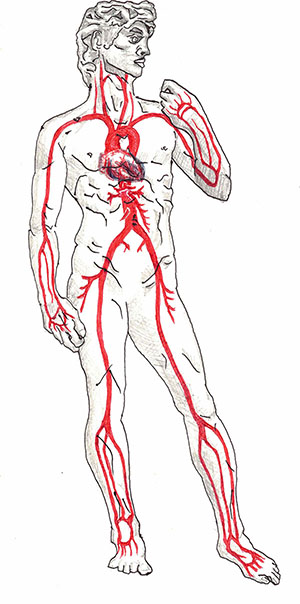

What is a Vascular Surgeon?
Vascular surgeons are specialists who are highly trained in treating diseases of the blood vessels. Blood vessels (arteries carry oxygen-rich blood and veins carry blood back to the heart) are the roadways of your circulatory system. Without smoothly flowing blood, your body cannot function properly. Conditions such as hardening of the arteries (arteriosclerosis) can create “traffic jams” in your circulatory system, obstructing the flow of blood to any part of the body.
Vascular surgeons manage veins and arteries in every part of the body except the brain and the heart.
For example, vascular surgeons handle blocked carotid arteries in the neck. They treat the problems of the aorta (a large main artery) after it leaves the heart and enters the abdomen. A vascular surgeon also treats peripheral vascular disease, which affects the arteries in the legs and feet.
A vascular surgeon does far more than surgery.
A vascular surgeon makes sure patients with vascular health issues know and understand all their options. In short, vascular surgeons can do surgery, but they see and treat many patients who don’t require surgery. Many vascular problems can be treated with lifestyle modification, medication or exercise.
A vascular surgeon is able to do every kind of procedure.
Some specialists only perform one or two kinds of vascular interventions, so their patients tend to get those treatments. Vascular surgeons are trained in all established procedures, that is, open, complicated surgery and minimally invasive (endovascular) procedures. Some patients may need one or a combination of both types of intervention, while many may not need surgery at all. Our patients can be assured of receiving the best option for their particular need.
A vascular surgeon builds relationships with patients.
Some types of surgeons come into your life to perform a procedure, make sure you heal and then leave; that’s their role. A vascular surgeon may be someone who treats you on an ongoing basis for decades. A vascular surgeon very often has long term relationships with patients because vascular disease is often a long term condition. If you have vascular disease, you can trust a vascular surgeon to care about your long term health and to consider all your options.
How do I know I need to see a vascular surgeon?
Patients are commonly referred to a vascular surgeon by their primary care physician or GP. For example, if you see your regular doctor for a new pain in your legs and learn that you have peripheral arterial disease, you will be referred to a vascular surgeon for further care. Sometimes patients become acquainted with a vascular surgeon after an unexpected event lands them in the hospital. If you are in a high-risk category: are a smoker, diabetic, and/or have high blood pressure, you may be a candidate for specialist attention by a vascular surgeon.
What is a Vascular Surgeon?
Vascular surgeons are specialists who are highly trained in treating diseases of the blood vessels. Blood vessels (arteries carry oxygen-rich blood and veins carry blood back to the heart) are the roadways of your circulatory system. Without smoothly flowing blood, your body cannot function properly. Conditions such as hardening of the arteries (arteriosclerosis) can create “traffic jams” in your circulatory system, obstructing the flow of blood to any part of the body.
Vascular surgeons manage veins and arteries in every part of the body except the brain and the heart.
For example, vascular surgeons handle blocked carotid arteries in the neck. They treat the problems of the aorta (a large main artery) after it leaves the heart and enters the abdomen. A vascular surgeon also treats peripheral vascular disease, which affects the arteries in the legs and feet.

A vascular surgeon does far more than surgery.
A vascular surgeon makes sure patients with vascular health issues know and understand all their options. In short, vascular surgeons can do surgery, but they see and treat many patients who don’t require surgery. Many vascular problems can be treated with lifestyle modification, medication or exercise.
A vascular surgeon is able to do every kind of procedure.
Some specialists only perform one or two kinds of vascular interventions, so their patients tend to get those treatments. Vascular surgeons are trained in all established procedures, that is, open, complicated surgery and minimally invasive (endovascular) procedures. Some patients may need one or a combination of both types of intervention, while many may not need surgery at all. Our patients can be assured of receiving the best option for their particular need.
A vascular surgeon builds relationships with patients.
Some types of surgeons come into your life to perform a procedure, make sure you heal and then leave; that’s their role. A vascular surgeon may be someone who treats you on an ongoing basis for decades. A vascular surgeon very often has long term relationships with patients because vascular disease is often a long term condition. If you have vascular disease, you can trust a vascular surgeon to care about your long term health and to consider all your options.

How do I know I need to see a vascular surgeon?
Patients are commonly referred to a vascular surgeon by their primary care physician or GP. For example, if you see your regular doctor for a new pain in your legs and learn that you have peripheral arterial disease, you will be referred to a vascular surgeon for further care. Sometimes patients become acquainted with a vascular surgeon after an unexpected event lands them in the hospital. If you are in a high-risk category: are a smoker, diabetic, and/or have high blood pressure, you may be a candidate for specialist attention by a vascular surgeon.

